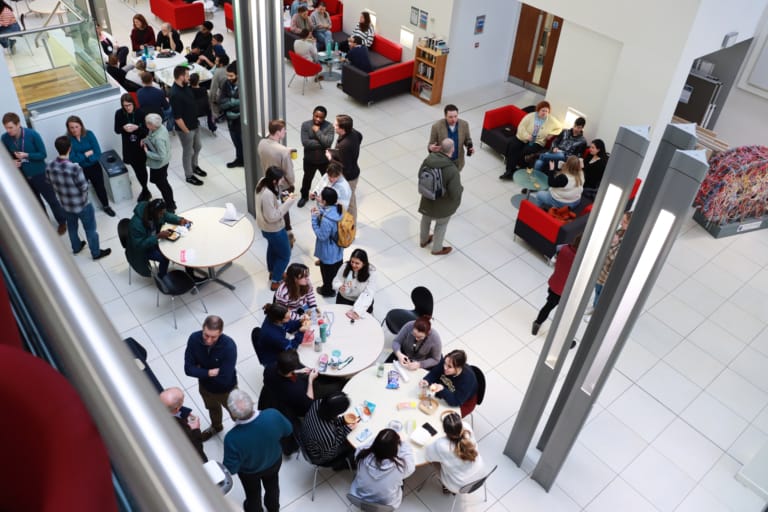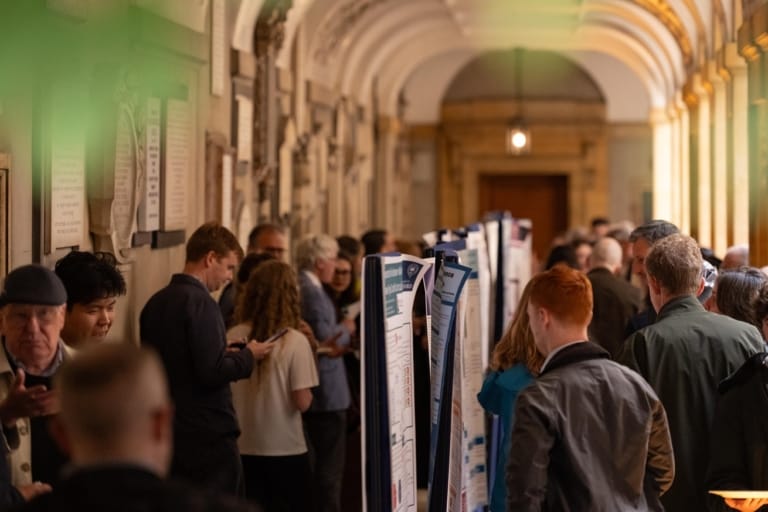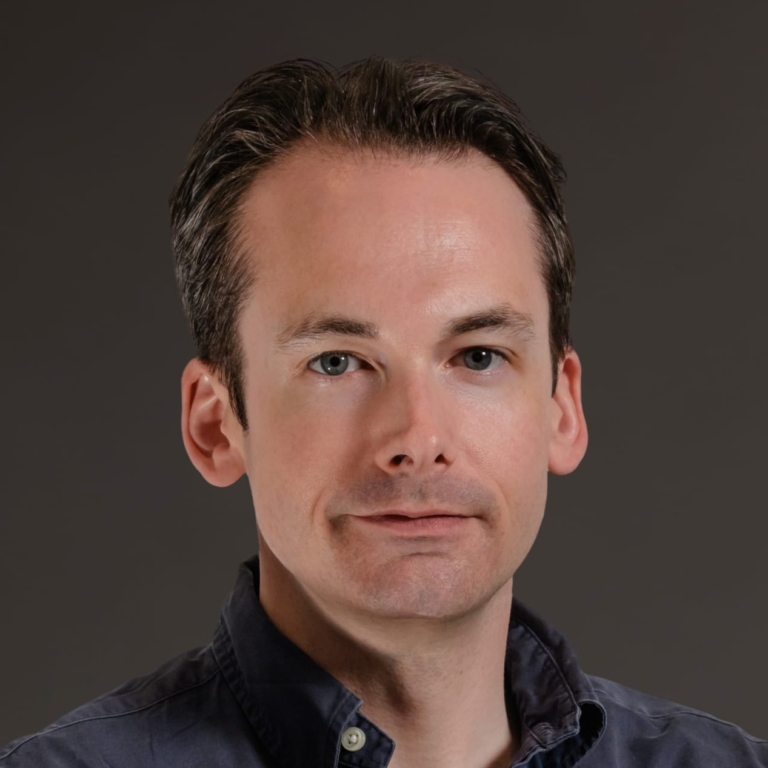On Friday the 6th of November 2019 the Lister Institute held its 35th Annual Research Fellowship Meeting and AGM.
In the magnificent setting of Corpus Christi College, University of Oxford, more than 70 current and former Members, Fellows and Governing Body members met to discuss the latest work funded, enabled and inspired by the Lister Institute.

Corpus Christi College is over 500 years old and includes a number of notable alumni including the writer Vikram Seth, the financial commentator Martin Wolf, the philosopher Isaiah Berlin, former Leader of the Labour Party Ed Miliband, and former Foreign Secretary David Miliband.This annual event is a fantastic opportunity for Lister Institute Members and Fellows to meet and interact with each other in order to build a stronger community across the wider Lister network.
At the meeting the delegation was updated with the latest research, financial, operational and administrative matters pertaining to the Institute’s ongoing work, enabling all attendees to understand the full range of activities that the Institute carries out.
The 2019 Fellows were also introduced and each shared details of the forward-thinking research programmes that led to their award of one of our coveted research prizes.
In addition, a small number of former Fellows and a prestigious keynote speaker gave presentations on their latest achievements to the attendees.
Staff and committee changes
As an organisation we are very proud of the fact that we have always been able to attract highly regarded academics to participate on our committees.
Each year a handful of participants on those committees change hands, due to regular membership rotation or as personal and professional commitments evolve, and these personnel changes were shared and confirmed at the event. To find out the latest up-to-date listings please use the pages below:
In addition, there were a few changes to the Lister Institute management team shared at the event:
Sally Burtles has now taken over as Director from Kate Law. Kate has helped lead the Lister Institute with distinction for many years and she will be greatly missed by the entire community. Sally has held senior leadership roles in research and research management in several charities, universities and NHS hospitals and is excited about taking up the reins from Kate and helping the Institute continue to generate success for years to come.
Naomi King is stepping down as Administrator of the Institute from January 2020 and will be replaced by Nicola King. Naomi is the longest serving member of staff, having joined the Institute in 2000, and will also be deeply missed.
Finally, Susan Andrews is replacing Jacky Wilson as the Institute’s accountant and will help ensure that all financial matters continue to be handled with the highest level of professionalism.
You can find out more about these changes here.

Members of the Lister Institute management team featuring, from left to right, Professor Sir Alex Markham (Chairman), Michael French (Treasurer and Chairman of the Finance and Investment Committee), Professor John Iredale (Chairman of the Scientific Advisory Committee), Sally Burtles (Director) and Naomi King (Administrator).
Annual research prize applications
The Lister Institute remains one of the most prestigious sources of funding for cutting-edge biomedical research in the field and this year we received the highest ever number of completed applications.
At the annual event the details of the previous round of applications were shared with attendees, some of the highlight facts and figures are:
- There were 134 high-quality applications from across a wide range of specialisms.
- 37 separate institutions were represented in the applicants, including most of the highest-renowned organisations in the field.
- Applicants were roughly split equally between UK and other European countries, with around a quarter from the Republic of Ireland (RoI) reflecting the success of the Institute’s significant outreach efforts and growing representation.
All of these statistics, along with the high quality of the applications received, made for a very challenging interview day at which the Institute’s Scientific Advisory Committee had to select the winners from the short list.
Five winners were eventually chosen and each gave a speech on their research at the event. These are summarised below.
The 2019 Lister Research Prize winners
The winners of the 2019 Lister Institute Research Prizes are each named below along with a brief outline of the research programme that helped them win this year’s funding. Please note that we will give more details about each of these in subsequent posts, so check back often for more.
Dr Tim Blower, Durham University
Dr Blower carries out research into BacteRiophage EXclusion (BREX) – a new kind of phage-resistance system first identified in 2015. His research aims to gain a better understanding of how BREX works so that its potential as a biomedical tool in the development of therapies can be assessed in different areas. In addition, Dr Blower also intends to study interactions between phages and their hosts, which has implications for the use of phages as an alternative to antibiotics.
You can find out more about Dr Blower on the Durham University website

Dr Ross Chapman, University of Oxford
Dr Chapman studies DNA double-strand breaks (DSBs) and their repair regulation in genome diversification and cancer. DSBs are toxic and can lead to serious complications and Dr Chapman’s research is aimed at gaining a better understanding of the molecular mechanisms that establish an appropriate equilibrium between accurate and mutagenic DNA repair pathways, and why imbalances in this regulation result in cancer and human diseases.
You can find out more about Dr Chapman on the University of Oxford website

Dr Joanne Konkel, University of Manchester
Dr Konkel’s research covers immune response and control at the oral barrier. In particular Dr Konkel’s group is interested in the local signals and education pathways that are active at the oral barrier and which instruct other key components of the immune system, specifically monocytes and macrophages. Mucosal barrier surfaces are the major interfaces between our inside bodies and the outside world and each face unique physiological challenges that have many implications for effective therapies.
You can find out more about Dr Konkel on the University of Manchester website

Dr Michelle Linterman, The Babraham Institute
Dr Linterman carries out research into how inflammation in the body can remodel peripheral tissues so that they recruit B cells to the site where the inflammation occurs. Dr Linterman is also investigating how remodelled peripheral tissues support a germinal centre (GC) response in non-lymphoid tissues, which has implications for our understanding of tertiary lymphoid structures (TLSs). In particular Dr Linterman is researching how the influenza infection remodels the lung to support ectopic GCs in the body.
You can find out more about Dr Linterman on the Babraham Institute website

Dr William McEwan, University of Cambridge
Dr McEwan studies the relationship between ordered assemblies of proteins and neurodegenerative disease. Assemblies of proteins can gain access to naïve cells and promote templated aggregation that results in replication similar to classical infection. Dr McEwan’s group is currently determining the ability of an observed mechanism, in which host cells can be ‘educated’ to detect protein assemblies as a threat, to confer protection in in vivo models of neurodegeneration.
You can find out more about Dr McEwan on the University of Cambridge website
We will share more details of the 2019 prize winners and their innovative research in forthcoming articles on the website, so please look out for more.

Other Institute highlights
Alongside the information on our new Research Prize winners the event attendees were also informed about recent successes and standout achievements of current and former Fellows. We also share a lot of this news on our website news section throughout the year.
One of the major achievements in the Lister community this year was the fact that two members have been elected as Fellows of the Royal Society – Professor Anant Parekh of the Centre of Integrative Physiology at the University of Oxford and Professor Gurdyal Besra of the School of Biosciences at the University of Birmingham. You can read more about this here.
In addition, Madan Babu was awarded the EMBO Gold medal, and two other Lister Institute members were named as Young Investigators: Tom Baden and Yanlan Mao – find out more here.
The Lister Institute mentorship scheme
The Lister Institute’s extended community of distinguished researchers has always provided support for newer members and younger researchers.
In addition we also offer a more structured mentorship scheme to help early-career researchers to build and develop their potential.
The mentorship scheme was discussed at the event with attendees highlighting how important it has been to their careers in a variety of ways.
Lister Institute Fellow lectures
The annual event is an opportunity for the wider Lister community to hear some of the most successful and forward-thinking biomedical researchers in the UK and Republic of Ireland discuss their latest research.
To facilitate this a number of lectures are given by academics who have recently made major contributions to their field.
This year’s lectures were performed by Dr Serge Mostowy of the London School of Hygiene and Tropical Medicine and Professor Dino Giussani of the University of Cambridge.
Use of the cytoskeleton to control Shigella infection by Dr Serge Mostowy
Dr Mostowy is one of the most well-known researchers in the field of cytoskeleton response in the presence of infection. At the event he presented an overview of his research into the role of the cytoskeleton when the body is under attack by infection.
This research centres on septins. Septins are novel components of the cytoskeleton and they play a role in bacterial infection. They are also a structural determinant of last defence.Dr Mostowy’s laboratory has shown that septin cages can entrap intracystolic Shigella and prevent actin-based motility.
Septin can recognise and entrap dividing bacterial cells for delivery to lysosomes. Targeting septin biology is a new approach for infection control and also has wider implications for in vivo studies at both a single cell and whole animal level.
You can find out more about Dr Mostowy’s work here

Heart disease link to fetal hypoxia: An intergenerational perspective by Professor Dino Giussani
Fetal hypoxia is a common complication in pregnancy but the mechanisms by which it programmes cardiac and endothelial dysfunction in the offspring’s adult life are not well understood.Through an integrated research approach at in vivo, isolated organ, cellular and molecular levels Professor Giussani’s group have found evidence which indicates that oxidative stress in the fetal heart and vasculature underlies the mechanism via which prenatal hypoxia programmes cardiovascular dysfunction in later life.
Professor Giussani’s team has also shown that there is an intergenerational component to the effects which indicates that while the risk of programmed heart disease by adverse pregnancy can be transmitted across generations via the paternal line, protection against future heart disease via mitochondrial mechanisms can be passed on via the maternal line.
This work suggests that the ‘quality’ of a woman’s pregnancy will have implications not only for the health of her child but, if she has a daughter, also for the health of her grandchildren.
You can find out more about Professor Giussani’s work here

The Special Lister Lecture
The final item on the day’s agenda was the keynote lecture by Professor Patrick Maxwell, Regius Professor of Physic and Head of the School of Clinical Medicine of the University of Cambridge.
Professor Maxwell discussed his research into oxygen sensing and kidney diseases, explaining how a range of biochemical methods and genetic approaches have been used to understand how cells sense oxygen and how they behave in its availability.
A deeper understanding of the kidney’s oxygen feedback loop, involving eythropoietin (Epo) to increase red cell production, the hypoxia inducible factor (HIF) and the cells that underpin oxygen switching is contributing to improvements to therapies for humans.
A highly conserved pathway that operates in all metazoans has been uncovered and found to play a role in development, physiology and disease. The underlying oxygen sensing mechanism can be activated by small molecules which are now being tested as therapies for anaemia and ischaemic conditions.
Conclusion
We are very grateful to all of our organisers, guest speakers and attendees who make both the annual event and the Lister community what it is.
The next AGM will be held on 4/9/2020 and we’re already excited about hearing first-hand from all of the distinguished researchers who we are proud to think of as a part of the Lister Institute family.



